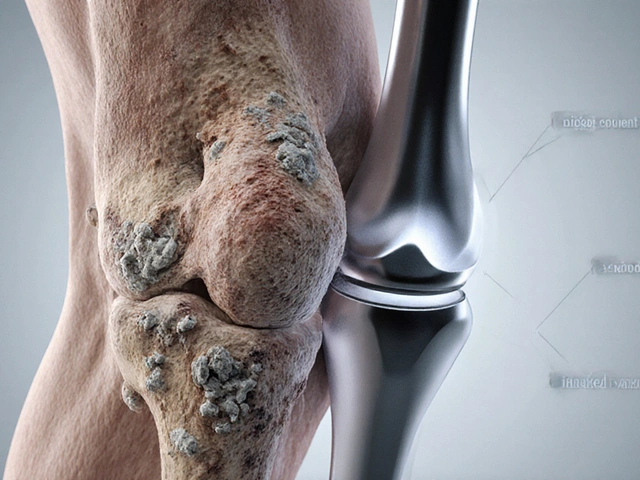Recovering from knee surgery is a journey, one that involves both anticipated and surprising changes to your daily routine. Among these changes, the timing of your bowel movements might not be the first thing on your mind, but it's an important part of your recovery.
Many who undergo knee replacement surgery find that their digestive system takes its time getting back to normal. This can be attributed to a number of factors such as anesthesia, pain medications, and changes in mobility.
In this article, we'll explore how long it usually takes for bowel function to return, the factors that contribute to post-surgery bowel delays, and offer some useful tips to facilitate this essential bodily function.
- Understanding Post-Surgery Constipation
- Factors That Affect Bowel Movements
- Timeline and Expectations
- Tips for Managing Bowel Regularity
Understanding Post-Surgery Constipation
Waking up after a knee surgery brings with it a checklist of things you need to keep an eye on. From movement to medication, each aspect of your recovery demands attention. Yet, one common but less spoken of aspect is post-surgery constipation. This is a normal phenomenon and affects a significant number of patients. But why does it occur? The primary culprit is the anesthesia and pain medications, like opioids, which often accompany a knee replacement. These substances, while excellent at numbing pain, also slow down the digestive system. What many don't realize is that these painkillers can significantly impact muscle contractions in the intestines, leading to a lag in bowel movements.
Another key factor to consider is the reduced mobility post-surgery. When you're lying in bed or spending most of your time sitting, your digestive system also takes on a slower pace. Regular physical movement is an inherent part of how our bodies digest food and regulate bowel movements. Additionally, the stress of surgery and the subsequent changes in diet can cause the digestive system to react unpredictably. Often, patients shift to a diet that's low in fiber, either due to hospital menus or post-operative dietary guidelines, which can further complicate digestion.
A study published in the Journal of Clinical Gastroenterology highlights how nearly 40% of patients undergoing major surgeries face significant constipation challenges during their recovery periods. While it may seem like a minor inconvenience compared to the overall healing process, unattended constipation can lead to other complications such as abdominal discomfort, nausea, or in severe cases, bowel obstruction. According to Dr. Jane Smith, an expert in post-operative care, "Addressing constipation proactively with dietary changes and gentle physical therapy can vastly improve a patient's overall recovery experience." She emphasizes that understanding and monitoring digestive health is just as crucial as managing pain and mobility.
So what can be done? It begins with acknowledging the possibility of constipation post-surgery and preparing for it even before the operation. Patients are often advised to maintain a balanced diet high in fiber both before and after surgery. Hydration also plays a vital role in keeping things moving in the digestive tract. Drinking plenty of water can also counteract the binding effects of opioid medications. Physical therapists often recommend specific exercises that can be performed even while lying in bed. These exercises gently stimulate muscle contractions in the abdomen, helping to wake up a sluggish gut. Finally, discuss with your healthcare provider about any laxatives or stool softeners that might aid during your recovery journey, ensuring they align with your health needs and medication intake.
There are specific dietary inclusions that can be a game-changer in managing this concern. Foods like oats, prunes, and bran have a nature that can assist digestive motility. Including such elements in your recovery diet can pave the way to alleviating constipation woes. You might be surprised at how effectively a small serving of prunes each day can act as a natural remedy. Regular intake over a series of days can offer relief without the need for chemical aids. Recovery from knee surgery is a comprehensive journey, and understanding each component, including constipation, sets you on the path to a quicker, more comfortable return to your everyday activities.

Factors That Affect Bowel Movements
After a knee replacement surgery, many patients are surprised to find their bowel movement routines have shifted dramatically. This change isn't just a coincidence; it's driven by a mosaic of factors that intertwine in unique ways for each individual. One of the primary contributors is the anesthesia used during surgery. Anesthesia can linger in your system and slows down gut motility, which affects the regularity of your bowel movements. This is often compounded by post-surgery pain medications, particularly opioids, which are notorious for causing constipation by directly influencing the digestive tract's nerve signals.
In addition to medical factors, there's the question of mobility—or the lack thereof. Reduced movement can significantly impede normal digestive processes. Walking and general physical activity stimulate the gut, promoting regular bowel movements. But post-surgery, when you're likely restrained to bed or limited to minimal movement, the bowels can become a little lazy. Your nutritional intake can also be a player in this mix. Many patients find that their hospital diet, while balanced, might not include sufficient fiber, which is crucial for preventing constipation. Adding naturally fibrous foods back into your diet as soon as possible can make a noticeable difference.
Impact of Diet and Hydration
Hydration plays a critical role in determining how smoothly your digestive system functions. Dehydration is quite common during the recovery phase because patients might be hesitant to drink large amounts of water due to reduced mobility and the effort required to use the bathroom. Yet, water is vital as it helps keep stools soft and easier to pass. An interesting observation comes from a clinical review published in the 'Journal of Anesthesia and Clinical Research,' which emphasizes that patients who prioritize fluid intake post-surgery often encounter fewer issues with bowel movement regularity.
“Regular check-ins with healthcare professionals about dietary choices and fluid intake can preemptively address many post-operative digestive issues,” notes Dr. Allison Morris, a renowned gastroenterologist.
Behavioral changes after surgery, like disrupted sleep patterns and high-stress levels, can also sneak into the equation. Stress hormones such as cortisol have been linked to impaired bowel function. Incorporating simple stress-relief techniques such as meditation or guided breathing exercises can promote an environment conducive to recovery, not just for your knee but for your digestive system as well. It's a complex interplay where no single factor stands alone; instead, it's a balancing act that demands gentle attention.
Addressing Medication Side Effects
It's worth delving deeper into the role of medications in post-surgery bowel changes. The transition from hospital pain relief to home medication is pivotal. Opioids, often prescribed for pain management post-knee surgery, bind to receptors in the gut, reducing motility and leading to constipation. It's crucial to have a conversation with your healthcare provider about alternatives or adjuncts to opioids, such as using acetaminophen or NSAIDs where appropriate.
| Medication | Potential Digestive Impact |
|---|---|
| Opioids | Severe constipation, reduced motility |
| NSAIDs | Less constipating but may irritate the gut lining |
Considerations can also extend to the use of stool softeners or gentle laxatives on a short-term basis as a preventive approach against constipation. However, using them under medical guidance is paramount as they might impact absorption of nutrients if not adequately managed.
In summary, while having a regular bowel movement post-surgery might seem like a simple, everyday task, the aftermath of knee surgery makes it a noteworthy challenge. By understanding the various factors that come into play, and addressing each one systematically, this aspect of recovery can be managed effectively, leading to a smoother experience overall.

Timeline and Expectations
As you embark on the road to recovery after knee surgery, it's crucial to understand what to expect regarding your body's digestive function. Initially, the combination of anesthesia, pain medication, and a change in physical activity can significantly slow down your digestive system, leading to constipation. It's quite common for patients to notice this delay immediately following surgery, with the majority experiencing a bowel movement within three to five days after the procedure. However, some might find their first experience in the bathroom occurs even sooner, while others may take a bit longer, closer to a week.
The role of anesthesia cannot be overstressed in this context. It relaxes the body's muscles, including those of the intestines, leading to a temporary slowdown or halting of bowel activity. Pain medications, especially opioids, are notorious for their constipating side effects. Their role in post-surgical care is to manage pain, but they often interfere with the bowel's natural rhythm. A study published in the Journal of Pain Research elaborates on this, indicating that patients on opioids have a significantly delayed return to normal bowel function compared to those on non-opioid pain management plans.
According to Dr. Michael Roizen, Chief Wellness Officer at the Cleveland Clinic, "Post-surgical constipation is a common issue that can be managed with proactive strategies like hydration and mobility exercises."
In addition to medication, changes in diet and hydration during your hospital stay might affect how quickly your bowels resume their regular schedule. Hospitals often recommend a diet initially rich in clear fluids, which might not provide the fiber necessary to stimulate your intestines. Once home, increasing fiber intake through fruits, vegetables, and whole grains can gradually aid in reestablishing normal bowel movements. Try to incorporate these foods into meals and monitor your body’s response carefully.
Mobility plays a pivotal role in restoring normal bowel function. Movement encourages intestinal activity, so gentle exercises recommended by your physical therapist not only aid your knee recovery but also help your digestive system. Walking, even short distances within your home, can boost intestinal motility. The key is to balance rest and gentle activity to support both your overall recovery and digestive health. Carefully plan these activities to integrate them seamlessly into your healing process.
The Importance of Patience and Monitoring
Although it might feel frustrating when you're waiting for your digestive system to return to its routine, patience is essential. Keeping track of your progress and symptoms can provide valuable insights into your recovery. Note any significant discomfort or the presence of symptoms such as nausea or severe abdominal pain, as these might require medical attention. Communication with your healthcare provider is crucial during this time, enabling adjustments in your care plan if necessary.
It's key to recognize that everyone's recovery is unique, and as such, the timeline for bowel movements may vary widely. Maintaining a balanced diet, staying hydrated, and following your prescribed post-operative care plan will generally aid in bringing your digestive system back to its normal speed.

Tips for Managing Bowel Regularity
Keeping your bowels moving smoothly after knee surgery can feel daunting but taking proactive steps can make a significant difference. It’s common for post-surgery patients to encounter constipation due to reduced physical activity, pain medications, and changes in diet. Understanding how to address these issues can help ease discomfort and promote regularity. Start by considering your diet; integrating fiber-rich foods like fruits, vegetables, and whole grains into your meals can offer your digestion system much-needed support. Hydration is another key factor—drinking plenty of water can help soften stools, making them easier to pass.
Physical movement, though initially limited post-surgery, plays an essential role in promoting bowel health. Gentle activities such as walking or physician-recommended exercises can help stimulate bowel function. It's worth noting, a study highlighted in The Journal of Clinical Gastroenterology found that even modest physical activity can increase gastrointestinal transit time by up to 30%. Remember to discuss any new exercise routines with your healthcare provider to ensure they’re appropriate for your stage of recovery.
The influence of medications can't be overlooked either. Opioid medication, often prescribed to manage pain after knee replacement, can lead to constipation. Consult with your doctor about adjusting medicines or incorporating laxatives or stool softeners to mitigate these effects. A balanced approach to medication management is crucial in maintaining regular bowel movements.
"Persistent constipation following surgery is something we often see," says Dr. Mitchell B. Goldstein, a well-respected gastroenterologist. "Attentive monitoring and addressing the root causes, such as diet and medication, can significantly improve outcomes."
A home remedy approach can also prove beneficial. Some find success with incorporating probiotics, which are beneficial bacteria that can aid in digestion. These can be found in supplements or fermented foods like yogurt and kefir. Starting your day with a warm beverage like herbal tea can stimulate your digestive system and encourage movement.
Knee surgery recovery presents unique challenges to bowel regularity, but incorporating these strategies can help manage and alleviate discomfort effectively. If constipation persists despite these efforts, it’s essential to speak with your healthcare provider for additional tailored advice. They might suggest further interventions or adjustments to ensure a comfortable and smooth recovery process.








